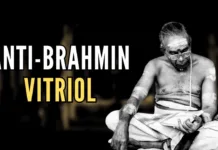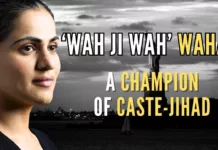
Recently, not even a month ago, in Northern California, in a global technology organization, a story broke that one Indian, let’s name him “Tanmay”, was offended when he was bypassed for a senior role. “Tanmay” is a Dalit. His manager, let’s call him Shankar Iyer a Brahmin, offered the position to “Kailas”, a fictitious name for the purpose of this article. “Tanmay” approached the “very impartial and unbiased” Equality Labs. They, along with “Tanmay”, filed a case against the boss, “Shankar Iyer”, as well as the organization. Let’s try and imagine the courtroom scene:
A big courtroom with pews, not all of them populated with people, while the lawyers walk around getting their documents in order before the judge walks in. On either side of the aisle, in the first row are the lawyers for both defendant and “victim”. The court reporter is ensuring the tapes are new and usable, while the court officer waits for the judge.
The lawyers make their statements in a clear and crisp manner. The prosecutor makes his/ her statement accusing the Defendant of “Casteism” and asks for a swift decision in favor of the prosecution.
At exactly the time of the hearing, the court officer announces “All Rise”. People stand up. The judge walks in and sits. People sit down too. “Tanmay” is confident (over-confident?) while “Shankar” fidgets with his tie, a clear sign of nervousness; and why shouldn’t he be? In his 45 years as a citizen of this planet, he had never seen the inside of a court. The court officer announces, in his loud voice, “Case of Tanmay v. Shankar – Judge XYZ presiding”. The judge bangs his gavel and says,
“Gentlemen, keep your opening remarks short”.
The lawyers make their statements in a clear and crisp manner. The prosecutor makes his/ her statement accusing the Defendant of “Casteism” and asks for a swift decision in favor of the prosecution. The defence lawyer, young but confident, makes his plea, asking that the case be dismissed. Now, that I have set the stage, let’s see what the courtroom scene looks like, as the proceedings begin:
Judge: Mr Prosecutor, please call your client.
(Prosecutor calls Tanmay. The court officer swears him in and Tanmay sits down)
Prosecutor: Please state your name.
Tanmay: You already know my name, so why are you asking again? It’s Tanmay.
Prosecutor: Where do you work?
Tanmay: Again, you already know this. Why are you asking questions that you know the answer to?
A loud cluttering sound is heard as the court reporter is on the floor, laughing!
The court officer steps out of the room. A second later, he is heard laughing loudly for the whole court to hear.
Judge: Order, um, order in the court! (Holding back his laughter).
Prosecutor (flustered): Please answer the question for the court.
Tanmay (A light flashing in his brain): Oh, got it! A global technology giant by the name of ….
Prosecutor: How old are you? What caste do you belong to?
Tanmay: 33 years old (a practised dismayed look on his face) I belong to the Dalit caste.
Prosecutor: What caste does your manager belong to?
Tanmay: Upper caste! He’s a Brahmin.
Prosecutor: How does this work? Brahmins are upper caste and you’re not?
Tanmay (wiping practised tears): Yes, I am from the lowest caste, called Dalits. We are considered untouchables.
Prosecutor (a smirk on his face): Your witness, Defense Lawyer (DL).
DL: Thanks. So you didn’t get the job because you’re a Dalit.
Tanmay (exuding confidence and a practised smile): Yes
DL: So, who got it?
Tanmay: Got what?
DL: The job you didn’t get.
Tanmay: Oh that, Kailas, my colleague
DL: And what caste is Kailas?
Tanmay (rattled but still confident): What difference does it make? The fact is my manager is a Brahmin and I’m a Dalit.
DL: Please answer the question.
Tanmay (whispers): Dalit
DL: Say that loudly, please
Tanmay (nervously): Dalit.
DL: So how is this casteism? He’s a Dalit and so are you!
Tanmay: Well, the boss is not a Dalit and he didn’t give me the job.
DL: But your own statement is that Kailas is a Dalit. A Dalit got the job!
Tanmay (beads of sweat on his face): But I didn’t! Kailas is not me!!
DL: Did you apply for the job?
Tanmay: No, I was not aware of this opening.
DL: Then how did you expect to get a job you didn’t apply for, or to use your words, “were not aware of”?
Tanmay: Because he didn’t even consider me for the job! Kailas is not even a Dalit! No Dalit can look that fair-skinned!
DL: But, he is. Even you admitted it! So, it couldn’t be about caste. Why do you think your boss chose Kailas over you?
Tanmay: Maybe because I’m dark-skinned and Kailas isn’t.
DL: So, you’re saying it’s skin color?
Prosecutor: Objection, your Honor! The defence is putting words into my client’s mouth.
DL: I certainly am not! He said color, not I!
Judge: Objection overruled. Please continue.
DL: Please answer my question.
Tanmay (now sweating profusely): That’s what I said
DL: Then, why are you charging my client with casteism?
Tanmay: Because my manager is a Brahmin and I’m a Dalit!
DL: But the fact remains that Kailas IS a Dalit!
The courtroom is now breaking into derisive mirth and laughter at the comical answers of the “victim”, and the situation Tanmay has placed himself in, making Tanmay even more nervous. At this point, the judge says “I have heard enough! Case dismissed”.
Tanmay walks to the table, wiping his face, and asks the prosecutor “How did I do?” The prosecutor, rather than answering this insane question, walks away.
While the above scene feels like it belongs to a comedy show (or movie), this case isn’t. It really has happened, courtesy of the “very unbiased” Equality Labs. If you think anyone could make this up, you don’t know Equality Labs!!! The fact of the matter is, most people in India don’t look at a person’s caste before hiring that person. In fact, they don’t, these days, look at the person. When I was hired by my employers, I met my former boss after 4 months of being in that organization. He was the one that interviewed me. The interviews were all telephonic.
Including caste as a part of the AMERICAN electoral process is not just detrimental to America but to those Indians who have migrated to this wonderful land, like yours truly! Brahmins have been portrayed as the “evil” community. Evil exists in a person, not a community. Saying “All Brahmins are evil” is akin to me saying “All Muslims are terrorists”. It’s wrong! There are good people in the Muslim community like Dr Abdul Kalam just like there are good people in the Brahmin community. We have to take the trouble to talk to them.
In a time when the economy has become globalized, and organizations are looking at maximizing profits, the last thing an employer wants is a low performing, high caste person. Performance is what counts, not caste nor community. The bottom line is the Dollar, not the Dalit nor Brahmin.
If discrimination was all Equality Labs was looking for, would they be open to looking at the ”extremely fair and just” treatment being meted out to the Hindus, Sikhs, Buddhists and Christians (not necessarily in that order) in the “democratic and never ruled by dictators” country of Pakistan? Don’t hold your breath! That ain’t happening!!
Note:
1. The views expressed here are those of the author and do not necessarily represent or reflect the views of PGurus.
- My New Letter Series – Dear Pakistani (Un)Educated Media, Time To Talk Again… - February 7, 2024
- My New Letter Series – Dear Rahul Baba, Been A LOOOONG While…JAI SHRI RAM!! - January 21, 2024
- My New Letter Series – Dear Former PM Shabby (Shehbaz), Hope You’re Doing Well - December 28, 2023











Caste discrimination is prevalent in US. I see that a lot in Telugu. It’s based on last name. And subsequent verification. If there are two candidates in who has similar skills and did interview similarly, the person with the caste belonging to the manager is selected. I work in a company where the employees of few managers are 80% people belonging to their caste, and 20% belonging to other caste. And the one belonging to their caste is projected in front of senior management for promotions.